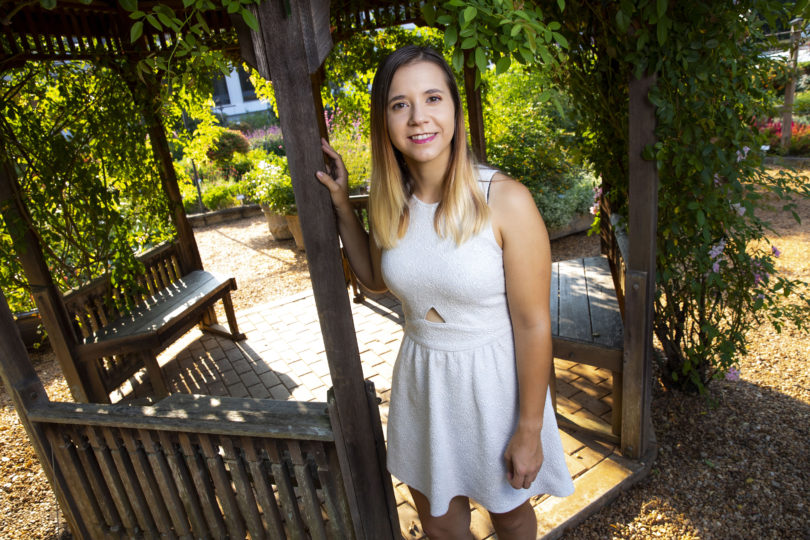Research has played a defining role in the academic journey of Goldwater Scholar Sarah Saddoris, and as a plant biologist her goal is to improve the production of the global food supply.
Hometown:
Greenville, SC
High school:
Riverside High School
Family ties to UGA:
None. I will be the first in my immediate family to hold a degree higher than an Associate’s.
Expected graduation:
Spring 2020
Degree objective:
B.S. in plant biology
University highlights, achievements, awards and scholarships:
My experience as a college student and at UGA is quite different from that of most of my undergraduate peers. Following my high school graduation, I spent two years in Germany, where I was enrolled in a nursing program. Upon returning to the States, I moved to Athens and began taking courses at Athens Technical College. I was also lucky enough to have the opportunity to work in an epigenetics research lab at UGA, where I fell in love with research and plant biology. I transferred to UGA the following spring and have maintained my position as a full-time research technician throughout my studies.
As my primary focus, research has played a defining role in my studies. I have spent my fair share of Friday nights in the lab finishing experiments at 2 in the morning and many game days in Davison Life Sciences (benchwork waits for no man!). I have also had the opportunity to present my research at various venues: In 2017, I received a travel award to present a poster at UGA’s Plant Center Retreat and the following summer I received another travel award to present my research in Montreal, Canada, at the American Society of Plant Biologists international conference. Of course, I have also given oral presentations at other small symposia on campus, such as the CURO Spring Symposium.
This past spring, I was honored to be named a Goldwater Scholar. I am so grateful that my commitment to research and passion for aiding in the quest for reliable food sources were recognized nationally.
I chose to attend UGA because …
… we have arguably the best plant biology program in the country!
My favorite things to do on campus are …
… well, I admittedly have an addiction to Einstein Bros. Bagels, and unfortunately, I work in close proximity to one — so naturally, I find myself there all too often. But in all seriousness, I love being outside and enjoying our beautiful campus.
When I have free time, I like …
Most of my free time is dedicated to various sports with my German wirehaired pointer, Hubble. We are involved in competitive obedience, agility, tracking, rally, conformation, NAVHDA/hunt tests (upland and retriever), dock diving and canicross/urban mushing. I also have a wirehaired dachshund, Darwin, who is the most adorable agility dog you will meet and jumps a whopping 4 inches. When I’m not at the bench, analyzing data, in class, studying or training my dogs, you can usually find me at Ramsey — or napping, it’s really a toss-up between the two.
My favorite place to study is …
… the collaborative study space at the Main Library or the commons area at the Science Learning Center —both are in close proximity to Einstein Bros. Bagels, which is always an important consideration when studying.
My favorite professor is …
This is definitely a toss-up between two professors who have been pivotal in supporting my research in plant sciences.
While I have not had the pleasure of taking one of Bob Schmitz’s courses, he has been a very important mentor for me during my time as a research technician. Bob has not only pushed me to become a more thoughtful and well-rounded researcher, but he has always been understanding of the problems that come with being a full-time student in addition to full-time staff.
I had my first introduction to coding and data analysis through Alex Bucksch’s PBIO4700 class. He guided me all the way through opening up the terminal for the first time and using UGA’s awesome high-performance computing center all the way to becoming a proficient Python coder. This introduction to computer science has helped me become a versatile scientist, in that I am competent both at my bench and at my desk. Alex is able to combine two vastly different fields — biology and computer science — in such an innovative and exciting way that I truly admire.
Aside from being amazing academics, both of these professors are simply great people. They both are committed to shaping the next generation of scientists, both in the classroom and in the lab, who will help the world confront a variety of issues.
What is your passion and how are you committed to pursuing it?
I am interested in the mechanisms and functions of the various pathways in plants that are responsible for controlling gene expression during development and in response to biotic and abiotic stresses, such as pathogens and drought. The threat of climate change is no longer imminent, but is already upon us, as is the issue of overpopulation. These two problems have created a lofty demand of plant biologists: provide crops that are capable of meeting the demands of the human population while withstanding the stresses of drought, salty waters and pests. My goal is to contribute to this global effort by developing integrated approaches to crop improvement. I hope to establish my own research laboratory that elegantly combines fields such as genomics, epigenetics, bioinformatics and population genetics to ultimately provide farmers with resistant, high-yield crops.
After graduation, I plan to …
… attend Freie Universität Berlin for a master’s degree in bioinformatics and genomics and eventually obtain my Ph.D.







